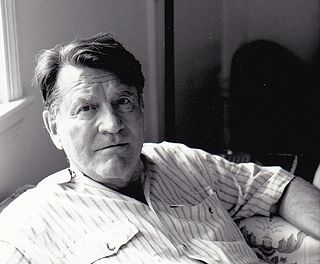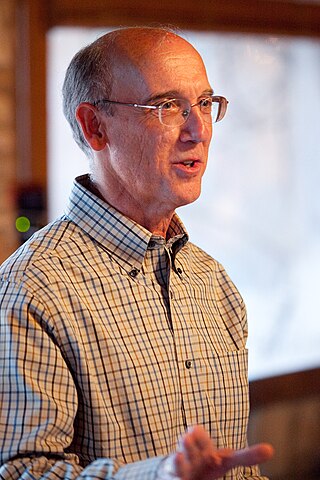Lynn Hoffman (Paris, France, September 10, 1924; December 21, 2017) [1] [2] was an American social worker, family therapist, author and historian of family therapy. Her mother, Ruth Reeves was a painter, Art Deco textile designer and an originator of the American Index of Design. She graduated summa cum laude in English literature in 1946 from Radcliffe College, and after editing psychology works, she started MSW studies in 1969 and specialized in family therapy. [3]
Originally a systems-strategic theorist and therapist, she became a proponent of post-systems/post-modern/collaborative approaches. She was an advisory editor of Family Process and Journal of Marital & Family Therapy . Until her retirement in 2000, she had for many years been on the faculty of the Ackerman Institute and the Smith College School of Social Work. She spent her last years as a lecturer at Saint Joseph College in West Hartford, Connecticut. [4]
Solution-focused (brief) therapy (SFBT) is a goal-directed collaborative approach to psychotherapeutic change that is conducted through direct observation of clients' responses to a series of precisely constructed questions. Based upon social constructivist thinking and Wittgensteinian philosophy, SFBT focuses on addressing what clients want to achieve without exploring the history and provenance of problem(s). SF therapy sessions typically focus on the present and future, focusing on the past only to the degree necessary for communicating empathy and accurate understanding of the client's concerns.
Couples therapy attempts to improve romantic relationships and resolve interpersonal conflicts.

Narrative therapy is a form of psychotherapy that seeks to help patients identify their values and the skills associated with them. It provides the patient with knowledge of their ability to live these values so they can effectively confront current and future problems. The therapist seeks to help the patient co-author a new narrative about themselves by investigating the history of those values. Narrative therapy is a social justice approach to therapeutic conversations, seeking to challenge dominant discourses that shape people's lives in destructive ways. While narrative work is typically located within the field of family therapy, many authors and practitioners report using these ideas and practices in community work, schools and higher education. Narrative therapy has come to be associated with collaborative as well as person-centered therapy.
Salvador Minuchin was a family therapist born and raised in San Salvador, Entre Ríos, Argentina. He developed structural family therapy, which addresses problems within a family by charting the relationships between family members, or between subsets of family. These charts represent power dynamics as well as the boundaries between different subsystems. The therapist tries to disrupt dysfunctional relationships within the family, and cause them to settle back into a healthier pattern.

Jay Douglas Haley was one of the founding figures of Problem-solving brief therapy and family therapy in general and of the strategic model of psychotherapy, and he was one of the more accomplished teachers, clinical supervisors, and authors in these disciplines.
The Internal Family Systems Model (IFS) is an integrative approach to individual psychotherapy developed by Richard C. Schwartz in the 1980s. It combines systems thinking with the view that the mind is made up of relatively discrete subpersonalities, each with its own unique viewpoint and qualities. IFS uses systems psychology, particularly as developed for family therapy, to understand how these collections of subpersonalities are organized.
Systemic therapy is a type of psychotherapy that seeks to address people in relationships, dealing with the interactions of groups and their interactional patterns and dynamics.
Triangulation is a term in psychology most closely associated with the work of Murray Bowen known as family therapy. Bowen theorized that a two-person emotional system is unstable, in that under stress it forms itself into a three-person system or triangle.
Harlene Anderson is an American psychologist and a cofounder of the Postmodern Collaborative Approach to therapy. In the 1980s, Anderson and her colleague Harold A. Goolishian pioneered a new technique that is used to relate to patients within therapy through language and collaboration, and without the use of diagnostic labels. This approach to therapy places the patient in control of the therapy session and asks the therapist to focus on the present session and ignore any preconceived notions they may have. This approach was first developed for the use of family and mental health therapists, but has since expanded into a variety of professional practices such as organizational psychology, higher education, and research.
Emotionally focused therapy and emotion-focused therapy (EFT) are a set of related approaches to psychotherapy with individuals, couples, or families. EFT approaches include elements of experiential therapy, systemic therapy, and attachment theory. EFT is usually a short-term treatment. EFT approaches are based on the premise that human emotions are connected to human needs, and therefore emotions have an innately adaptive potential that, if activated and worked through, can help people change problematic emotional states and interpersonal relationships. Emotion-focused therapy for individuals was originally known as process-experiential therapy, and it is still sometimes called by that name.
Collaborative therapy is a therapy developed by Harlene Anderson, along with Harold A. Goolishian (1924–1991), in the US. It is intended for clients who are well educated in any field, or for those that have distrust of psychotherapists due to past negative experiences with one or more.
Common factors theory, a theory guiding some research in clinical psychology and counseling psychology, proposes that different approaches and evidence-based practices in psychotherapy and counseling share common factors that account for much of the effectiveness of a psychological treatment. This is in contrast to the view that the effectiveness of psychotherapy and counseling is best explained by specific or unique factors that are suited to treatment of particular problems.

Michele Weiner-Davis is a licensed clinical social worker, marriage and family therapist and author in the field of family therapy. She is frequently quoted in the media and has been interviewed significantly on television news programs regarding divorce prevention. Weiner-Davis has often been referred to as The Divorce Buster after coining the term “divorce busting” at an American Association for Marriage and Family Therapy conference in 1989. She currently writes a regular column, Divorce Busting: Musings From an Unabashed Marriage Saver in Psychology Today.

Donald H. Baucom, is a clinical psychology faculty member at the University of North Carolina-Chapel Hill. He is recognized for founding the field of Cognitive-Behavioral Couples Therapy. Baucom is also recognized as one of the top marital therapists and most prolific researchers in this field. Currently, Baucom's National Cancer Institute funded study, CanThrive, has the largest observationally coded sample of any couples study to date.
Family therapy is a branch of psychotherapy focused on families and couples in intimate relationships to nurture change and development. It tends to view change in terms of the systems of interaction between family members.
The Houston Galveston Institute is a non-profit organization that offers collaborative counselling and postmodern therapy to individuals, families and communities. The institute is strongly associated with collaborative language systems, a type of postmodern therapy that works with clients via a cooperative partnership to access their own natural resources and develop solutions to their problems. The Houston Galveston Institute is a sponsor of the International Journal of Collaborative Practices.
Collaborative language systems is a therapeutic approach largely based in contemporary hermeneutics, the study of interpretation as a way to produce understanding, while considering both context and cognition, as well as social constructionism. This approach involves a reciprocal relationship between both the therapist and client, through which the client works through his or her clinical problems using dialogical conversation with the therapist. The therapist and client work together, utilizing their own, individual knowledge and understanding of the issues, to conceptualize and illuminate the client’s problems and provide new context, meaning and comprehension to those problems based on the collaboration.
Jay Lebow is an American family psychologist who is senior scholar at the Family Institute at Northwestern University, clinical professor at Northwestern University and is editor-in-chief of the journal Family Process. He is board certified by the American Board of Professional Psychology. Lebow is known for his publications and presentations about the practice of couple and family therapy, integrative psychotherapy, the relationship of research and psychotherapy practice, and psychotherapy in difficult divorce, as well as for his role as an editor in the fields of couple and family therapy and family science. He is the author or editor of 13 books and has written 200 journal articles and book chapters.
Co-therapy or conjoint therapy is a kind of psychotherapy conducted with more than one therapist present. This kind of therapy is especially applied during couple therapy. Carl Whitaker and Virginia Satir are credited as the founders of co-therapy. Co-therapy dates back to the early twentieth century in Vienna, where psychoanalytic practices were first taking place. It was originally named "multiple therapy" by Alfred Alder, and later introduced separately as "co-therapy" in the 1940s. Co-therapy began with two therapists of differing abilities, one essentially learning from the other, and providing the opportunity to hear feedback on their work.
Froma Walsh is an American clinical psychologist and family therapist. She is the co-founder and co-director of the Chicago Center for Family Health and the Mose and Sylvia Firestone Professor Emerita at the University of Chicago.